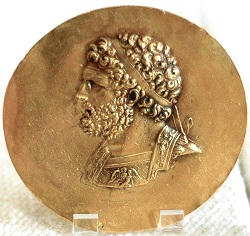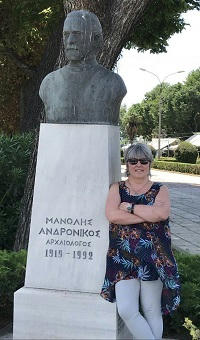
Hiya Peeps! We have Jeanne Reames stopping by today with her new release Dancing with the Lion: Rise, we have a fantastic guest post, a great excerpt and a fabulous giveaway, so check out the post and then leave a comment to enter the giveaway! ❤️ ~Pixie~
Dancing With The Lion: Rise
Jeanne Reames
Two boys, one heroic bond, and the molding of Greece’s greatest son.
Before he became known as Alexander the Great, he was Alexandros, the teenage son of the king of Makedon. Rather than living a life of luxury, as prince he has to be better and learn faster than his peers, tackling problems without any help. One such problem involves his increasingly complicated feelings for his new companion, Hephaistion.
When Alexandros and Hephaistion go to study under the philosopher Aristoteles, their evolving relationship becomes even harder to navigate. Strength, competition, and status define one’s fate in their world—a world that seems to have little room for the tenderness growing between them.
Alexandros is expected to command, not to crave the warmth of friendship with an equal. In a kingdom where his shrewd mother and sister are deemed inferior for their sex, and his love for Hephaistion could be seen as submission to an older boy, Alexandros longs to be a human being when everyone but Hephaistion just wants him to be a king.
Reader discretion advised. This title contains the following sensitive themes: Emotional Abuse, Explicit Violence, Self-Harm

Jeanne Reames!
KHAIRĒ (again)!
As I said when introducing Book 1: Becoming, that’s “Howdy” in ancient Greek.
Thank you for joining me to kick off the release of Dancing with the Lion: Rise, the second half of my duology about ancient Greece and Alexander before he became “the Great.”
We have a Riptide gift card of $10 to offer, drawing made from those who comment or ask questions, one entry per blog. I’ve prepared entries about everything from ancient Greek food to ancient Greek love magic to Alexander’s sisters, as well as more about his relationship with Hephaistion, and with his father, King Philip.
I also want to let everybody know, there are some additional goodies on the series website, Alexander’s Macedonia.
Among these goodies are EXTRA SCENES, including cut scenes from book 1, newly added cut scenes from book 2, but also three additional scenes that occurred in the 9-10 months between the events of Becoming and Rise. One of them is a novelette of 10,000 words that shows the boys from (mostly) the adults’ point of view.
I hope you enjoy not just the tour blogs, but also the conclusion to my saga about Alexander’s youth.
Amyntor, Philippos, and Fathering!
As a coming-of-age tale, dynamics between fathers and sons play a crucial role in both novels, making Philippos and Amyntor deliberate foils. Some of this is laid out in Becoming, but in Rise, it occupies front-and-center.
Philippos’s own father died when he was relatively young. In addition, he spent at least one, and possibly two, hostage-ships outside Macedon. He had nothing approaching a normal childhood, even allowing for having grown up royal at a polygamous court. (His father had two wives and at least seven children: six sons and a daughter, maybe more, as daughters weren’t always recorded.) His time as a hostage at the house of Pammenes in Thebes might have been the closest to normal he ever experienced, although later gossip implied that it wasn’t a fatherly relationship the young Theban general had with the teenaged Philippos.
 Despite all that (or because of it), the thought he put into Alexandros’s education suggests deep concern not only to raise a son, but an heir who could survive the bloodbath of Macedonian inheritance. Even before Aristoteles arrives, Alexandros’s schooling was based on a southern Greek model. Later, after he returned from study, Philippos gave him increasingly important duties, yet always under guidance. This is the period covered by Rise. So if our instinct is to critique Philippos for being harsh, we must measure it against his own childhood, and his desire that his son survive. He wants to be a good father; he just doesn’t know what that looks like.
Despite all that (or because of it), the thought he put into Alexandros’s education suggests deep concern not only to raise a son, but an heir who could survive the bloodbath of Macedonian inheritance. Even before Aristoteles arrives, Alexandros’s schooling was based on a southern Greek model. Later, after he returned from study, Philippos gave him increasingly important duties, yet always under guidance. This is the period covered by Rise. So if our instinct is to critique Philippos for being harsh, we must measure it against his own childhood, and his desire that his son survive. He wants to be a good father; he just doesn’t know what that looks like.
As a teen, Alexandros is often overconfident, thinking himself ready for appointments he’s not ready for. Philippos knows better, and does a masterful job of selecting tasks he can manage. Quite contrary to portrayals of Philippos as jealous and trying to hold back Alexandros, when looked at from outside the lens of later propaganda, Philippos fairly consistently sought to teach his heir the essentials of ruling. They had some spectacular blow-ups, but the evidence says they got along as often as not.
Yet there IS a darker side to Philippos: his tendency to violence when frustrated. Unfortunately, Alexandros frustrates him on a number of occasions (as does Myrtalē). I do want to note that this construction is fictional. Evidence that the real Philip of Macedon engaged in regular domestic violence is circumstantial and scarce, outside the “wedding incident.” But I took that event and built on it, given cultural assumptions of the time.
The ancient world permitted, even expected harsh discipline. If they didn’t have mass shootings or serial killers, compared to today, their world was “casually brutal.” Beating a slave for bad behavior or just a perception of laziness was not only allowed, but encouraged. Paddling children or using switches or canes was normal. Slapping a wife or mistress didn’t raise much comment. By no means did every adult male do such things, and there’s indication that beating one’s wife or children was stigmatized, this was mostly as evidence of a lack of self-control. Not because aggression itself was considered wrong.
In one key scene at the beginning of Rise, Alexandros starts to ape his father’s usual response when frustrated by his mother: he raises his arm to strike her. Yet he stops himself. He chooses not to become his father. It isn’t, however, a magic fix. We know that men who engage in assault came, themselves, from violent homes. Children learn what they live. Going forward, Alexandros will face the same choice on other occasions in his life, and sometimes, he’ll fail the test.
So the uncomfortable conflict at the heart of both novels is that Philippos does love his son, does want him to succeed, but finds him frustrating and difficult, and reacts with a brutality he always later regrets.
Yet while he may be the novel’s antagonist, he’s not the “bad guy.”
Making an abuser the bad guy is tempting. How could someone love his son, yet leave him with bruises (or worse)? To claim such a thing might seem to be making excuses. That’s where the tightrope walking begins. Philippos does bad things, which are acknowledged as bad things, yet he repents and tries to make up for them, usually awkwardly. He’s a bad father because he doesn’t know how to be a good father, and that’s his tragedy. He was a magnificent strategist, a wiley negotiator, and a visionary king…but a crappy dad.
Enter Amyntor.
First, Amyntor has a good ten years on Philippos, and four children older than Hephaistion. In short, he has more practice. Furthermore, he and Hephaistion are much alike, personality-wise, something underscored several times in both novels. Amyntor understands his youngest. So he’s presented as the “good father.”
But he’s not a perfect father. Those don’t exist. I’d remind readers of what set in motion events at the start of Becoming (book I): Hephaistion ran away from home.
He did so because he was a teen boy, stubborn and headstrong. Yet Amyntor made mistakes, too, which led to Hephaistion’s bad choices. Both are human. They’re doing the best they can, given their own limited perception of things. And I drew them so, because even well-intentioned, mature people can still screw up. The difference is in how they react. Amyntor doesn’t try to force Hephaistion to come home, quite aside from whether he legally could have. He doesn’t do so because he recognizes his son’s autonomy and respects it, even if he doesn’t agree with it. His reaction is sorrow and worry, not uncontrollable anger.
That’s where he steps away from Philippos. He’s the “good father” because he’s emotionally mature. Anger is a fear reaction, and Philippos learned young to be terrified. When threatened: attack. Amyntor responds to the world in a wholly different way, and teaches his own children the same, plus a few “strays”: Ptolemaios and Alexandros.
The irony, of course, is that his political acumen isn’t terribly high. If not as clueless as his son thinks, he’s an isolationist by policy, unconcerned (and thus, ignorant) of wider Greek affairs of state and their ramifications. So Hephaistion comes to Pella to learn politics from Philippos. But in the end, it’s Alexandros who learns the greater lesson from Amyntor, who models what fatherhood should look like.
For victims to escape the cycle of violence, they have to know there are other options. Amyntor (and Hephaistion) represent those alternatives for Alexandros.
Excerpt!
Chapter One: Regent
Water-curled hair hinted that Alexandros had come straight from a bath, and Philippos shook his head. Would he ever understand his son? Artaxerxes and the entire Persikoi army might be sitting on the palace steps, but Alexandros would probably have a bath before seeing to it. Whatever his personal peculiarities, however, he’d become a good soldier. There’d been no more rash incidents like that night in Thrakē two years ago. The army called him “Philippos’s Lion Cub” now.
He was also strong. Not tall, but strong: deep chest, broad shoulders, and sinewy thighs showing the hours he spent on horseback. Yet it had come on him slowly, letting him escape the stretched angularity suffered by most adolescents. More, he didn’t slouch. It took a man by surprise to come up beside him only to look down. At a distance, carriage, charisma, and a deep voice made him appear larger.
“I heard you got in from Thrakē yesterday,” Alexandros said. “How long are you staying?”
“Not long. I came for reinforcements; two days and we march for the Khersonesos.” He kicked out a chair for his son, who took the seat, slight frown creasing his brow. “This campaign is interminable.” No doubt the boy was planning for the muster, might even be hoping his recent summons from Mieza was to tell him he was being promoted to command a full squadron of two hundred horse. Philippos judged him ready for it, but the men wouldn’t accept him at sixteen. Of course, he was too hot-blooded to see that. Philippos had a better solution in any case, one that would placate and benefit him both. He tossed the boy a ring. “Think you can keep an eye on that while I’m gone again?”
Alexandros’s eyes widened in recognition. “The Seal?”
“Last I checked, it was.”
“Why’re you giving it to me?”
“Why does a king usually give a man the Seal?”
“To make him regent, but . . .” Alexandros’s face was a study in contrasting expressions; he would never bluff an enemy. “You’re making me . . . I’m the . . . but Antipatros—”
“Antipatros is staying behind to advise you, and Eumenes too. You’re a good leader, a decent soldier, but no administrator. Yet. That comes with experience, and I think it’s time you got some.” Picking up a stylus from the table, he turned it in his hands. “Listen to your advisors, learn to figure the treasury, judge a case, and control your mother. Above all, keep my supply lines open. This is no game. You foul up and I’ll be back here before you can spit. Antipatros will have the Seal. Understand?”
“Yes, sir.” Alexandros was so far gone in amazement, he’d forgotten to bristle at the backhanded slight to Olympias.
“Good boy.” Philippos smoothed his beard. “You’re itching for a promotion; don’t think I don’t know it.” Alexandros grinned at that. “Show me you can keep affairs straight here and I’ll trust you with two hundred horse in a battle—maybe even three hundred.” The Royal Squadron. As prince, once he was old enough, it would be his. The king stood. “Anything to say?”
He hadn’t really expected anything, so it surprised him when Alexandros spoke softly, “Thank you, Pappás.”
His son rarely called him Pappás, only Pater, Father, and Philippos hadn’t realized he’d missed it until he heard it. Then he laughed at himself. You’re a sentimental old fool. But it didn’t change the depth of his feelings any.
“Don’t get cocky on me, now,” he said, because he didn’t know how to say, I’m proud of you. For once, Alexandros must have recognized the real meaning instead of inventing some bedamned one of his own, and smiled. Philippos grinned back, then gestured for the boy to pull around his chair. “Let me show you my plans. You should know them.” Casually, he set a hand on his son’s shoulder. Alexandros didn’t lean away.
***
Alexandros couldn’t help strutting a bit when he left, and his first impulse was to find Hephaistion. Instead, he sought out his mother. She’d resent it if he told Hephaistion first. Her dislike of his friend felt to Alexandros like rejection of himself by proxy, forcing him to conceal things from her, not because he was ashamed, but because she refused to understand and he didn’t want to fight about it.
She sat in the courtyard, an abacus and wax tablets scattered on the flagstones around her. She made notes on another as he arrived, muttering about lumber from the summer’s cutting and seed for the autumn planting. She held up a finger so he wouldn’t interrupt.
Kleopatra knelt on the porch behind, hands deep in a dyeing vat. Her long braid had fallen over her shoulder, soaking the tip in dark-red water. Alexandros fished it out for her, tying it in a knot at the back of her neck. “Kleo, you’re a mess,” he said fondly. He loved her with an uncomplicated love, and sat down beside her. She pecked his cheek with a kiss.
Nearby, two serving women carded and spun, and inside the corner room, others were weaving. From the kitchen came the clatter and rattle of cooks; it blended badly with the tinkle of water in the fountain and the murmur of women’s voices. The westering sun cast long shadows, painting the world in golden greens. After a pause like an indrawn breath, cicadas began their evening music.
Finishing her sums, his mother set down the tablet and looked over at him. He rose without saying anything and thrust the hand with the Seal right under her nose. Frowning, she batted at it, then stopped, stared, and grabbed the hand to see better. “Aleko!” Leaping to her feet, she threw arms around him.
His face flamed even whilst he felt absurdly pleased with himself. “Mammá!”
Kleopatra had left off dyeing, and he rolled his eyes at her as she grinned behind a hand.
Pushing him away, Myrtalē kissed both his cheeks. “I am so proud of you! You know what this means. From now on, everyone will see you as heir.” She hugged him again and he hugged back. “This is what I worked so long to secure—against Amyntas, Arrhidaios.” She pushed him away once more to see his face. “We’ve done it, Alexandros!”
We?
His pleasure cooled instantly. He had killed his boar at only twelve; he had fought in the front line; he had impressed his father enough to become the youngest officer in the Companions. What had she to do with any of that? He’d come to parade his success for her, not to have her steal it from him.
Yet what could he say? She’d carried him for nine months and never let him forget it hadn’t been an easy pregnancy. She’d also secured him Helanikē for a nurse and Leonidas for a tutor. Neither Arrhidaios nor Amyntas had received a noblewoman nurse nor Molossi prince for a lesson-master.
“Mammá,” he said, pulling away. “Please.” Her touch bothered him all of a sudden.
She laughed and tweaked his ear. “Young men! One minute they cuddle up like little boys and the next, they get all prickly like hedgehogs.” She sat down again and hugged herself from excitement. She was planning; he knew that look, blue eyes focused heavenward on something he couldn’t see.
Kleopatra came to embrace him, careful of her dripping hands. Next to their mother’s display, his sister’s seemed somehow more honest. His mother was wrapped up in herself; Kleopatra was thinking of him. The comparison startled him, as if he’d just seen his mother from a great height, and she looked small and diminished.
“What is it?” Myrtalē asked him. “You’re making a funny face.”
He couldn’t explain so he glanced out over the courtyard. “It’s nothing.”
“It’s not nothing; I know you too well. Why are you lying?”
Gaze flicking back, he found her frowning. Kleopatra had returned to her dye vat, silent, forgotten. He wished he could efface himself so easily, but he’d learned other strategies. Sighing grandly, he told her, “You always say I’m lying when I’m not lying.”
She looked down and the sun raised a nimbus over her yellow braids. She was lovely, like a pale rock rose. That and his guilt inclined him to make peace, until she said, “You never talk to me anymore.”
He balled his fists. “I talk. You don’t listen.”
“I don’t listen? I’ve listened to you all your life! And don’t you dare use that tone of voice with me, child.”
“Then don’t talk to me like I’m six. I’m a man now.”
Her eyes widened. “A man? You’re Hephaistion’s boy. You may wear the Seal but I wonder which of you will sit on the throne? You might fit on his lap.”
“Mother!” Lightness filled his head and humiliation crushed his chest. “Some things are none of your business.”
“Oh, I think it’s all Makedon’s business when their prince lets another man rule him.”
Enraged, he stepped forward until he stood over her. “But it’s all right if a woman does? That’s what you want, isn’t it? You snapping Fury—” His fist came up and she shrank back.
Appalled, he stopped. What was he doing?
“Go ahead. Hit me.” Although she cringed, she looked not the least afraid. “Call me a Fury, claim fury’s madness.”
But he wasn’t his father and she wouldn’t win so easily. “Stop trying to turn me against Hephaistion.” Spinning on his heel, he stalked away. Finding a storage room downstairs, he violently pulled the curtain to, then wrapped arms around his chest and dropped his head.
She bound him to her one moment, pushed him away the next, applauded, then shamed him. It tore his very heart and he didn’t understand her, nor what she wanted him to be. How could he be anything with her always there behind, telling him how much she’d done for him? She’d given him birth, secured him special tutors, even set him above his rivals with a bloodline that made him doubly royal. As if, without her, he was nothing.
Was it true? Alone, would he achieve nothing? His father on one side, his mother on the other. Was there nothing to which he could put his own name? Bringing a fist to his mouth, he bit down on the index finger until the pain spread and his shaking stopped. Then he took the fist away to examine it curiously, like some odd fish dredged from the depths. Teeth marks tattooed the knuckle and the finger was swelling. Shaking his head absently, he left the closet. Kleopatra was waiting on the other side.

Dancing With The Lion series!
Alexandros is expected to command, not to crave the warmth of friendship with an equal. In a kingdom where his shrewd mother and sister are deemed inferior for their sex, and his love for Hephaistion could be seen as submission to an older boy, Alexandros longs to be a human being when everyone but Hephaistion just wants him to be a king.
About Jeanne!
 Jeanne Reames has been scribbling fiction since 6th grade, when her “write a sentence with this vocabulary word” turned into paragraphs, then into stories…and her teacher let her get away with it—even encouraged her! But she wears a few other hats, too, including history professor, graduate program chair, and director of the Ancient Mediterranean Studies Program at her university. She’s written academic articles about Alexander and ancient Macedonia, and does her best to interest undergrads in Greek history by teaching them (et al.) to swear in ancient Greek.
Jeanne Reames has been scribbling fiction since 6th grade, when her “write a sentence with this vocabulary word” turned into paragraphs, then into stories…and her teacher let her get away with it—even encouraged her! But she wears a few other hats, too, including history professor, graduate program chair, and director of the Ancient Mediterranean Studies Program at her university. She’s written academic articles about Alexander and ancient Macedonia, and does her best to interest undergrads in Greek history by teaching them (et al.) to swear in ancient Greek.
Her Website: https://jeannereames.net/Dancing_with_the_Lion/DwtL.html
On Facebook: facebook.com/jeanne.reames.3
On Instagram: instagram.com/jeannereames
On Twitter: twitter.com/DrReames

Giveaway!
One lucky person will win a $10 voucher for Riptide!
(Each tour stop is a chance to enter by leaving a comment below.)
(Entries close at midnight, Eastern time, on October 26, 2019. Contest is NOT restricted to U.S. entries.)

Check out the other blogs on the tour!
Monday, 10/21
Erotica for All
Scattered Thoughts & Rogue Words
Dog-Eared Daydreams
Tuesday, 10/22
Boy Meets Boy Reviews
La Crimson Femme
Wednesday, 10/23
Love Bytes Reviews
We Three Queens
Thursday, 10/24
MM Good Book Reviews
Bayou Book Junkie
Friday, 10/25
Book Reviews and More by Kathy
Wicked Faerie’s Tales and Reviews
My Fiction Nook





Interesting.
jlshannon74 at gmail.com
Thank you for the post. Good luck with the release!
humhumbum AT yahoo DOT com
Thanks!